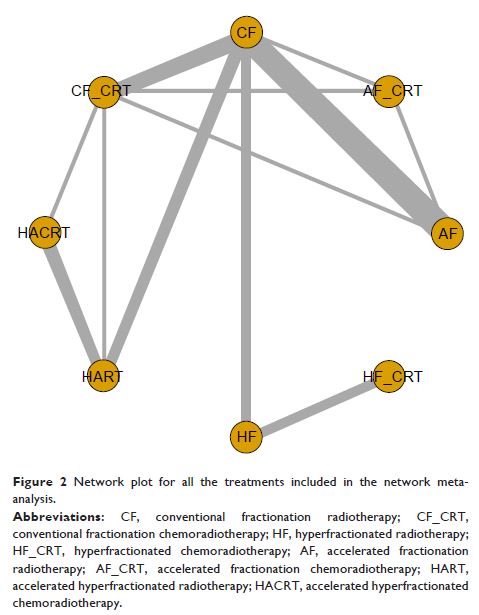108605
论文已发表
注册即可获取德孚的最新动态
IF 收录期刊
- 3.4 Breast Cancer (Dove Med Press)
- 3.2 Clin Epidemiol
- 2.6 Cancer Manag Res
- 2.9 Infect Drug Resist
- 3.7 Clin Interv Aging
- 5.1 Drug Des Dev Ther
- 3.1 Int J Chronic Obstr
- 6.6 Int J Nanomed
- 2.6 Int J Women's Health
- 2.9 Neuropsych Dis Treat
- 2.8 OncoTargets Ther
- 2.0 Patient Prefer Adher
- 2.2 Ther Clin Risk Manag
- 2.5 J Pain Res
- 3.0 Diabet Metab Synd Ob
- 3.2 Psychol Res Behav Ma
- 3.4 Nat Sci Sleep
- 1.8 Pharmgenomics Pers Med
- 2.0 Risk Manag Healthc Policy
- 4.1 J Inflamm Res
- 2.0 Int J Gen Med
- 3.4 J Hepatocell Carcinoma
- 3.0 J Asthma Allergy
- 2.2 Clin Cosmet Investig Dermatol
- 2.4 J Multidiscip Healthc

改变后的分次放疗(有或没有化疗)治疗头颈癌:一项网络荟萃分析
Authors Liu Y, Kou C, Bai W, Liu X, Song Y, Zhang L, Wang M, Zhang Y, You Y, Yin Y, Jiang X, Xin Y
Received 23 April 2018
Accepted for publication 7 July 2018
Published 4 September 2018 Volume 2018:11 Pages 5465—5483
DOI https://doi.org/10.2147/OTT.S172018
Checked for plagiarism Yes
Review by Single-blind
Peer reviewers approved by Dr Colin Mak
Peer reviewer comments 3
Editor who approved publication: Dr Federico Perche
Objectives: A Bayesian network meta-analysis (NMA) was conducted in patients with head and neck cancers (HNCs) to estimate the efficacy and safety of treatment with conventional fractionation radiotherapy (CF), conventional fractionation chemoradiotherapy (CF_CRT), hyperfractionated radiotherapy (HF), hyperfractionated chemoradiotherapy (HF_CRT), accelerated fractionation radiotherapy, accelerated fractionation chemoradiotherapy, accelerated hyperfractionated radiotherapy (HART) or accelerated hyperfractionated chemoradiotherapy (HACRT) to identify superior treatments to aid in clinical decisions.
Methods: PubMed, EMBASE and the Cochrane Central Register of Controlled Trials (CENTRAL) were searched for potentially eligible randomized controlled trials up to December 2016. Overall survival (OS), disease-free survival (DFS) and locoregional control (LRC) were considered efficacy outcomes, whereas acute toxicity and late toxicity on skin and mucosa were considered safety outcomes. The surface under the cumulative ranking curve (SUCRA) was calculated to rank each treatment in each index.
Results: Data from 72 trials with 21,868 participants were included in the analysis. Concerning OS, all treatments were associated with a significant advantage compared to CF alone, with HR effect sizes ranging from 0.64 to 0.83, and HACRT was significantly more effective than all the other treatments. The network comparisons of both HACRT vs HART and HF_CRT vs HF demonstrated a higher OS benefit, with an HR of 0.78 (95% credible interval [CrI]: 0.64–0.95) and 0.78 (95% CrI: 0.61–0.99), respectively. The results of SUCRA indicated that HACRT had the best ranking for OS and LRC, HF_CRT for DFS, HART for acute and late skin toxicity, CF_CRT for acute mucosal toxicity and HF_CRT for late mucosal toxicity.
Conclusion: The NMA results support the notion that HACRT is the preferable treatment modality for HNCs because it has better rankings in all three efficacy indexes, although it does present a high risk of acute mucosal toxicity.
Keywords: altered fractionation radiotherapy, head and neck cancer, randomized controlled trials, network meta-analysis
